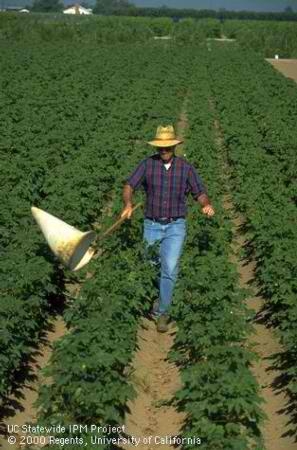Posts Tagged: UC Cooperative Extension
Deep Look's Award-Winning Aphid Video by Josh Cassidy--and a UC Davis Entomologist's Role
(Editor's Note: Watch Josh Cassidy's Deep Look award-winning video on YouTube.) UC Cooperative Extension specialist and...

Cooperative Extension specialist and agricultural entomologist Ian Grettenberger of the UC Davis Department of Entomology and Nematology is shown in this frame in KQED's Deep Look video on aphids. The work of Josh Cassidy, it won an international nature award, the equivalent of an Oscar. (Screen shot)
Ag Award Recipient Rachael Freeman Long: A UC Davis Professor Sparked Her Interest in Biocontrol
Rachael Freeman Long treasures her memories as a graduate student in entomology at the University of California, Davis. She remembers eating fried...

Rachael Long, UCCE farm advisor, leads a tour of her family farm in Yolo County in April of 2015. "Hedgerows are important for enhancing beneficial insects, including bees and natural enemies, for better biocontrol and crop pollination in adjacent field crops, with measurable economic benefits," she says. (Photo by Kathy Keatley Garvey)
Do You Know What's In a Hedgerow?
If you like to see lady beetles devouring aphids or assassin bugs piercing spotted cucumber beetles, then you'll love the workshop taking place...

A lady beetle, aka ladybug, devouring an aphid. (Photo by Kathy Keatley Garvey)

An assassin bug, a beneficial insect, targeting a pest, a spotted cucumber beetle. (Photo by Kathy Keatley Garvey)

A green lacewing looking for love. Photo by Kathy Keatley Garvey)
NPR talks about land grant universities
While visiting the Smithsonian Folklife Festival, which is commemorating the 150th anniversary of the Morrill Act, NPR's Talk of the Nation did a segment about land grant universities.
Sara from Fresno called into the show to explain the role of UC Cooperative Extension. She said: "...we use the extension service to help us determine what kinds of things we can use to keep the crop healthy, not just pesticides, but how to check the crops and to make sure that they're healthy. They use independent research all the time to help us with this. And with the public funds just dwindling, we have a lot less independent research that go on and have to go on more of what the chemical companies are telling us."
When asked for an example, according to the show's transcript, Sara said: "Well, I'm looking at a cotton crop right now, and the farmer advisers, the cotton farmer advisors in California, helped us what the program called plant mapping, where we were able to take a look at what's going on with the plant even though we might have bugs out that could be damaging the crops."
Sandy Rikoon, professor of rural sociology at the University of Missouri, told listeners, "Many countries are trying to duplicate the extension system. Many countries have research, agricultural research, but what they don't have is that group of people who take the research and then take it to the people."
Host Neal Conan mistakenly said the California State University is one of the land grants and we have asked NPR to correct the online version to state that UC is California's land grant institution.
New county director shares plans with paper
The newly named county director for San Joaquin County UC Cooperative Extension, Brent Holtz, was profiled in the Stockton Record today by the paper's longtime ag reporter, Reed Fujii. Holtz begins his new job Jan. 4, but was already able to share a goal.
"One of the crucial things I'm going to be working with is to try to get a Delta specialist position," Holtz was quoted in the story.
The Delta advisor would focus on issues concerning the unique soil and growing conditions of the inland estuary as well as the need to protect the quality of the Delta's waterways, the story said.
Fujii's article noted that Holtz earned his doctorate in plant pathology from UC Berkeley in 1993, and was a post-doc at the UC Kearney Research and Extension Center before beginning a 15-year stint as the plant pathology farm advisor in Madera County.
Ironically, the new job brings Holtz closer to home. He lives in Modesto with his wife and two sons, the story said.
"I'm actually going to be able to live in my house," Holtz told Fujii.
Holtz grew up in the San Joaquin County community of Escalon and his best friend's father, Robert J. Cabral, is the namesake of the new agricultural center where UC Cooperative Extension is housed.

Brent Holtz in the laboratory.


